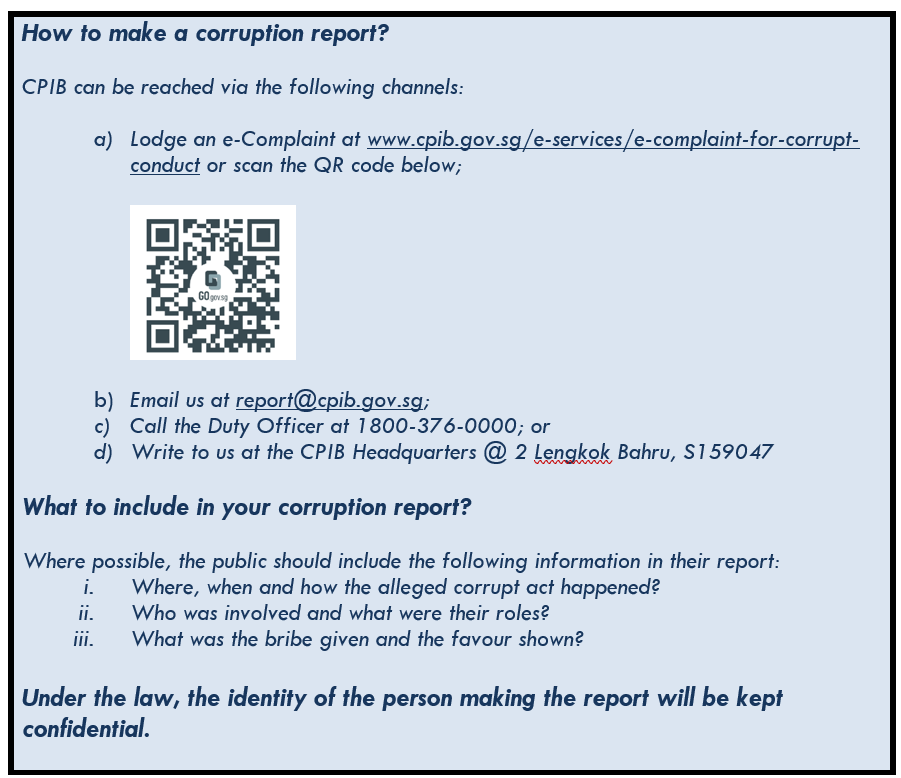Firm Enforcement, Strong Partnerships Key To Securing A Corruption Free Singapore
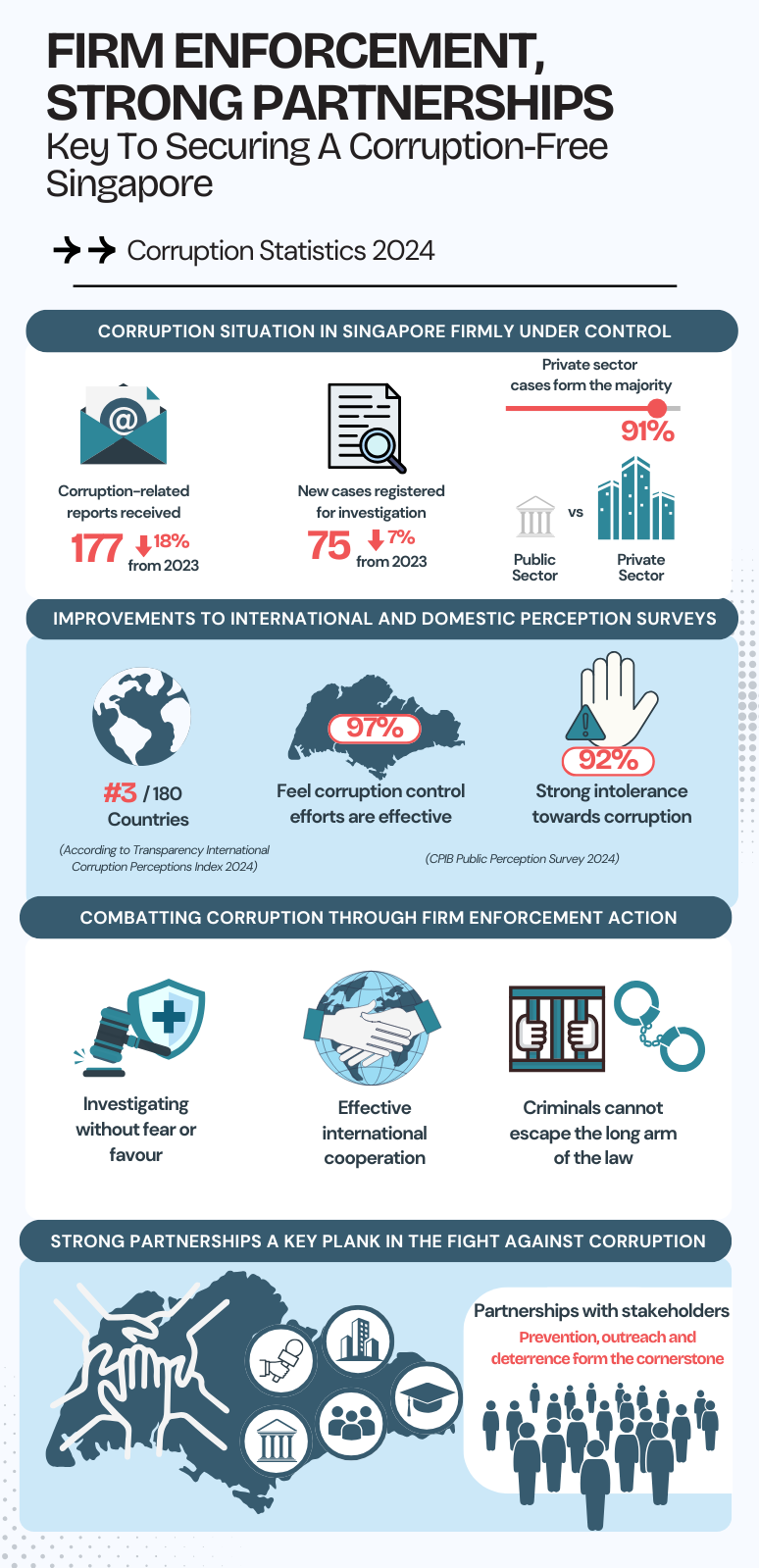
FIRM ENFORCEMENT, STRONG PARTNERSHIPS KEY TO SECURING A CORRUPTION-FREE SINGAPORE
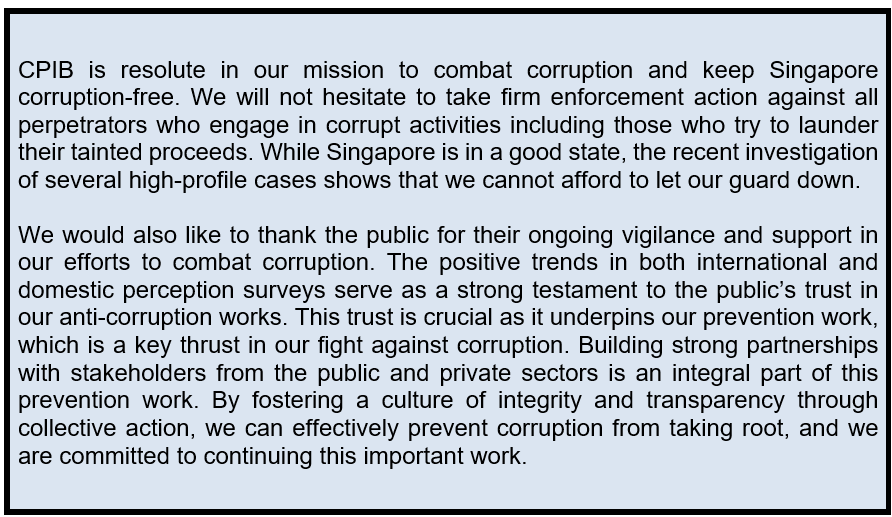
Corruption Situation in Singapore Remains Firmly Under Control
The corruption situation in Singapore remains firmly under control. The number of corruption-related reports received by CPIB, as well as the number of cases registered for investigation remained low. In 2024, CPIB received 177 corruption-related reports, an 18% decrease from the 215 corruption-related reports received in 2023. Of these 177 reports, CPIB registered 75 reports as new cases for investigation. This constituted 42% of the total number of corruption-related reports received in 2024, an increase of 7% compared to the average of the preceding 4 years (35%). (Figure 1). A report is registered for investigation if the information received is pursuable. This is determined by the quality of relevant information provided. Investigative enquiries and intelligence probes by CPIB also uncovered further information that enabled a higher percentage of reports to be registered for investigation.

2. CPIB treats all reports received seriously regardless of whether the complainant is named or anonymous. Of the 177 corruption-related reports received in 2024, 61 (34%) were anonymous. Of the 75 cases registered for investigation in 2024, 17 (23%) were anonymous.
Number of Public Sector Cases Remained Low
3. In 2024, 91% of the cases registered for investigation (68 cases) were from the private sector (Figure 2). Public sector cases accounted for 9% of all cases registered for investigation in 2024. Seven public sector cases were registered in 2024, which was fewer than the annual average (11 cases) of the preceding four years.
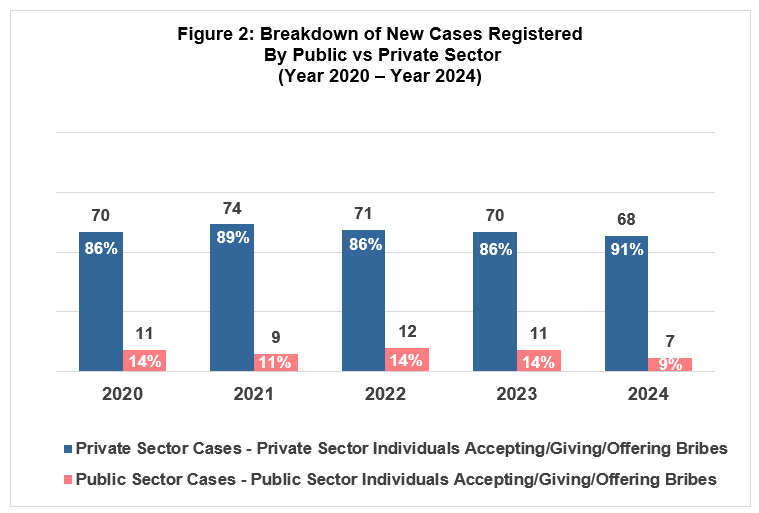
4. Of the 68 private sector cases, 12 cases (18%) involved public sector employees rejecting bribes offered by private sector individuals1. This was higher than the annual average (9 cases) of the preceding four years.
5. In 2024, 133 individuals were prosecuted in Court for offences investigated by CPIB. Of these, 96% (128) were private sector individuals while the remaining 4% (5) were public sector employees.
High Clearance Rate Maintained
6. CPIB maintained a high clearance rate2, completing investigation into 87% of subjects investigated in 2024 (Figure 3).

High Conviction Rate for CPIB Cases
7. The conviction rate for CPIB cases in 2024 stood at 97% (Figure 4). There were four acquittals in 2024 and three are currently pending appeal hearing by the Court.
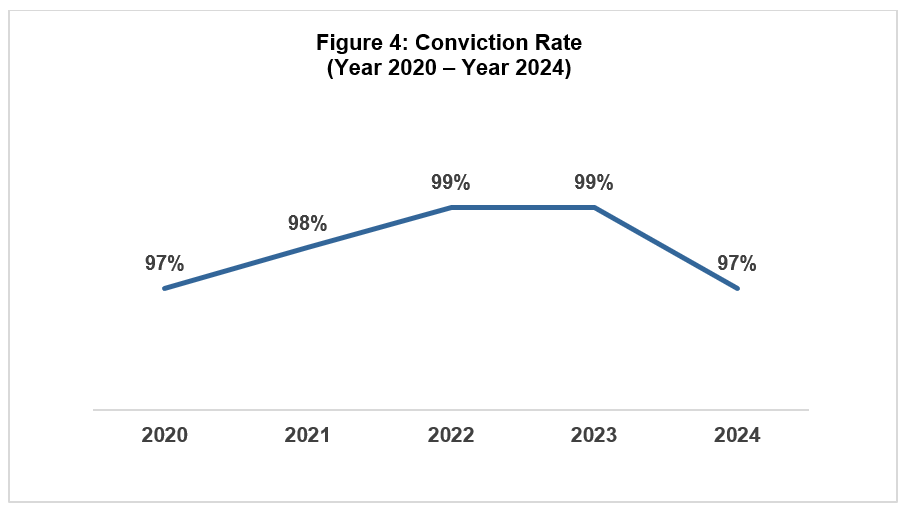
Improvement in International Rankings on Corruption
8. Singapore continues to be well-regarded internationally for our
anti-corruption framework and efforts. The latest Transparency International
(TI)’s Corruption Perceptions Index (CPI) has ranked Singapore the third
least corrupt country in the world out of 180 countries with a score of
84 out of 100. This is Singapore’s highest position since 2020 and the
first time since 2010 that Singapore is top in the Asia Pacific region.
The Political and Economic Risk Consultancy ranked Singapore as the least
corrupt country out of 16 economies in its 2024 Report on Corruption in Asia,
a position we have held since 1995. In the World Justice Project Rule of Law Index 2024,
Singapore maintained our ranking of third out of 142 countries for absence
of corruption in government.
Improvement in Public Perception of our Corruption Control Efforts
9. CPIB commissions the Public Perception Survey3 (PPS) to measure the perceived level of corruption in Singapore, public understanding of corruption, public awareness of CPIB and perception of the Bureau’s effectiveness in curbing corruption. It also seeks to understand attitudes towards reporting of corruption.
10. In the 2024 Survey, 97% of respondents rated corruption control efforts in Singapore as Good, Very Good or Excellent, up from 96% in 2022 and 94% in 2020. Heavy punishment for corruption offences, effective anti-corruption law, political determination to keep corruption under control and a zero-tolerance culture for corruption were cited as the top factors contributing to the low corruption rate in Singapore. 92% of respondents were totally or somewhat intolerant towards corruption, a significant improvement from 85% in 2022 and 80% in 2020 (Figure 5).

Combatting Corruption Through Firm Enforcement Action
11. CPIB continues to take firm enforcement action without fear or favour in corruption cases involving both the public and private sectors. Effective international cooperation with foreign counterparts is also vital in ensuring that cross-border criminals cannot escape the long arm of the law.
Case 1 – Investigation against Former Transport Minister S. Iswaran
On 24 September 2024, S. Iswaran pleaded guilty and was convicted in the High Court for the following charges:
-
Four charges under section 165 of the Penal Code for obtaining as a public servant, valuable things for no consideration from Malaysian businessman Ong Beng Seng (Ong) and Managing Director of Lum Chang Holdings, Lum Kok Seng (Lum).
-
One charge under section 204A(a) of the Penal Code for obstructing the course of justice.
On 3 October 2024, S. Iswaran was sentenced to 12 months’ imprisonment for these offences.
Ong was charged in Court on 4 October 2024 for an offence under section 165 read with section 109 of the Penal Code for abetting S. Iswaran to receive valuables for no consideration and an offence under section 204(a) for obstructing the course of justice. Ong’s case is currently before the Court.
Case 2 – Citiraya Case: Repatriation of Singaporean Accused from Foreign Jurisdiction
In 2005, CPIB investigated into a US$51 million embezzlement case involving a Singaporean, Ng Teck Lee (Ng), who was the Chief Executive and President of then-listed recycling company, Citiraya Industries Ltd (Citiraya). Ng had allegedly instructed Citiraya employees not to crush electronic scraps meant for extraction of precious metals but instead to repackage the scraps and export them. The scheme resulted in the misappropriation of around 89 tonnes of electronic scraps and generated illicit profits totalling over US$51 million.
Ng and his wife, Thor Chwee Hwa (Thor), absconded in 2005 when CPIB started
investigation. Despite placing the two on immigration stop list, the issuance
of a police gazette, warrants of arrest, and Interpol Red Notice, Ng and
his wife remained at large for almost two decades. With the assistance
of the Malaysian Anti-Corruption Commission (MACC), the couple was arrested
in Johor Bahru on 3 December 2024 and brought back to Singapore to face
charges on 4 December 2024. Ng and Thor face one charge of criminal breach
of trust under section 408 of the Penal Code and one charge under
the Corruption, Drug Trafficking and Other serious Crimes (Confiscation of Benefits) Act, respectively. CPIB
investigations are currently on-going.
Case 3 – Investigation against Two Individuals Related to Seatrium Limited (“Seatrium”)
CPIB completed investigation against Seatrium Limited4 for corrupt payments to advance its business interests in Brazil. Wong Weng Sun (Wong) [former President, Executive Director and CEO of Sembcorp Marine, and Managing Director of its wholly-owned subsidiary Jurong Shipyard Pte Ltd (JSPL) at the material time of the alleged offences] and Lee Fook Kang (Lee) (Senior General Manager at JSPL) were directly involved in making corrupt payments to Guilherme Esteves de Jesus (GDJ), a former business consultant for JSPL, and Estaleiro Jurong Aracruz Ltda (EJA), a subsidiary of Sembcorp Marine.
Between 2009 and 2014, Wong and Lee allegedly made corrupt payments of US$31.85 million, EUR10.5 million, and BRL5.07 million over at least eight occasions to GDJ for GDJ to in turn pay bribes to Brazilian politicians, judges, and senior officers of Brazilian state-owned entities. The corrupt payments to GDJ were disguised as service fees or commissions for consultancy services provided by GDJ.
Wong and Lee were charged for corruption on 24 March 2024. Wong was also charged for an offence of obstructing the course of justice. The case is currently before the Court.
Strong Partnerships a Key Plank in the Fight Against Corruption
12. Prevention, outreach and deterrence form the cornerstone of Singapore’s efforts to remain corruption-free. To strengthen these pillars, we actively foster partnerships with key stakeholders, including the media, which plays a vital role in amplifying anti-corruption messages and fostering public awareness. By engaging all segments of the community, we aim to build a cohesive front against corruption. Together we are committed to safeguarding Singapore’s reputation for integrity and incorruptibility. Additionally, private sector partnership is another key thrust in supporting this fight, in bolstering our collective efforts against corruption.
13. CPIB continues to engage private sector entities via the Anti-Corruption Partnership Network (ACPN) to share on anti-corruption best practices and corporate governance safeguards. In 2024, CPIB co-organised the annual ACPN engagement event with Changi Airport Group (CAG), which saw a turnout of more than 170 industry experts and anti-corruption practitioners. At the event, experts from CAG, Ernst & Young, and SPCS Consultancy shared on ISO 37001 Anti-Bribery Management Systems5 and advocated their adoption as part of corporate governance measures to prevent illicit activities such as corruption and money laundering.
Conclusion
14. Singapore’s corruption situation remains firmly under control. We will continue to strengthen partnerships with key stakeholders to enhance prevention efforts and amplify anti-corruption messages.
[1] Public sector employees who rejected bribes comprised officers from
the Immigration & Checkpoints Authority, the National Environment Agency,
and the Singapore Police Force.
[2] Clearance rate refers to the total number of subjects whom CPIB has
completed investigation on, out of the total number of subjects investigated
by CPIB in the year.
[3] CPIB engages an independent research company every two years to gauge
public perception on corruption and the Bureau. The survey is conducted
with approximately 1,000 individuals representative of the Singapore population
profile.
[4] Sembcorp Marine, a Singaporean state-owned company, was renamed Seatrium
Limited after it acquired Keppel Offshore & Marine in 2023. It is listed
on the Singapore Exchange (SGX).
[5] The ISO 37001 Anti-Bribery Management Systems was published in October
2016 and designed to help organisations establish, implement, maintain
and improve their anti-bribery compliance programmes. It includes a series
of globally recognised anti-bribery good practices for public and private
sectors organisations. It was developed by an ISO committee comprising
representatives from 61 countries including Singapore.
Corrupt Practices Investigation Bureau


